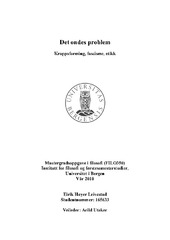Det ondes problem - Kroppsforming, fascisme, etikk
Master thesis
Permanent lenke
https://hdl.handle.net/1956/4140Utgivelsesdato
2010-05-19Metadata
Vis full innførselSamlinger
- Department of Philosophy [240]
Sammendrag
Oppgaven tar for seg spørsmålet om ondskap ut fra en distinksjon mellom det aktive og det reaktive. Denne distinksjonen antyder at hat og destruktivitet kan forstås som uttrykk for en reaktiv tilstand ved kroppen, produsert av sosiale regimer i deres forsøk på å forme mennesket gjennom utgrensning av kroppslige affekter og begjær. I et slikt perspektiv kan det hevdes at teknikkene som skal gjøre oss gode, selv skaper det onde. I første del av oppgaven analyseres fascismen som et reaktivt fenomen. Andre del undersøker distinksjonen mellom aktiv og reaktiv som kritisk modell. Tredje del diskuterer skillet mellom aktiv og reaktiv i forhold til dets etiske implikasjoner. The thesis approaches the question of evil within a framework marked by the distinction between active and reactive. This distinction postulates that human hatred and destructiveness could be viewed as a reactive condition of the body, produced by social regimes and morality in their effort to form human beings by hampering and repressing bodily affections and desires. According to this perspective, it is the failed view that bodily affections constitutes an evil, animal nature, something which must be repressed, that actually instills the perverted tendencies leading to violence, hatred, ressentiment and desire for repression. In the first part of the thesis, the phenomenon of fascism is explored within this framework, arguing that it may be understood as a reactive expression. The second part goes on to discuss active/reactive as a critical model, asking whether one can speak of body formation in terms of repression. This view seems to take for granted a certain naturalistic conception of bodily desires, which correlates to a certain monarchic conception of power as something that essentially represses. Finally, the distinction between active and reactive is discussed in its ethical dimension. By relating the ethical question to vitalism, an immanent and bodily conception of life, the distinction might offer an ethical alternative to the kind of morality it opposes.
Utgiver
The University of BergenOpphavsrett
Copyright the author. All rights reservedThe author
